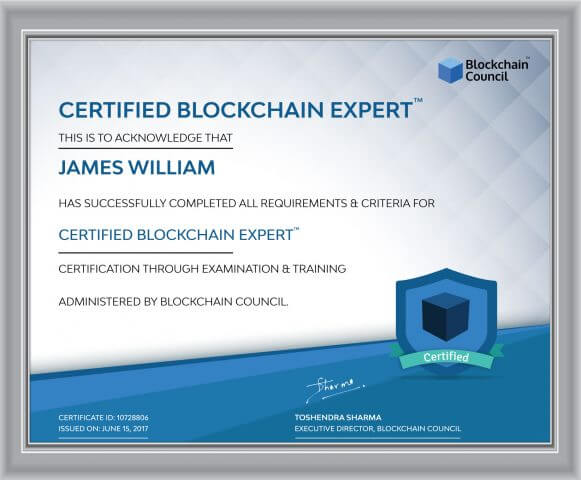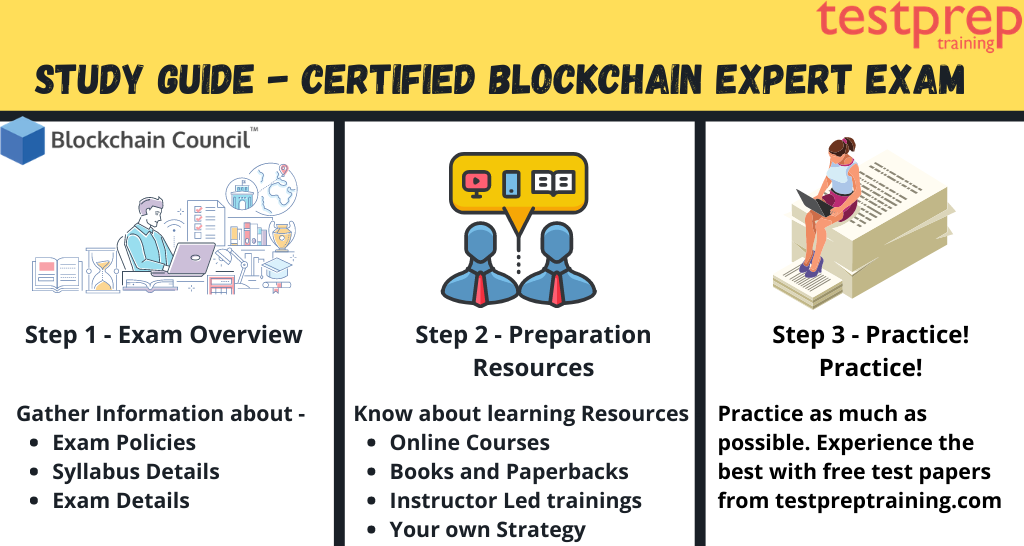You may have been hearing about blockchain everywhere—crypto, smart contracts, NFTs, DeFi—and now it feels like every job posting wants “blockchain knowledge” as a must-have skill. You have decided to get serious and go for the Certified Blockchain Expert (CBE) exam, which expects you to actually understand how blockchain works under the hood—things like consensus mechanisms, cryptography, tokenomics, and real-world use cases.
That’s usually where most people get stuck. They dive into endless articles or videos but end up feeling overwhelmed because everything seems either too technical or too simplified. The exam itself is known for being detailed and scenario-based, which means you can’t just cram definitions and hope for the best. Passing the CBE exam in 2025 is not about being a genius coder or a hardcore mathematician. It’s about having a structured preparation plan that cuts through the noise, focuses on the exam’s core areas, and balances theory with hands-on understanding. Once you know what to study (and what not to waste time on), the whole process becomes a lot less intimidating.
In this guide, we will break it down step by step, what’s on the exam, how to study smart, which areas people usually trip over, and how you can avoid those mistakes. By the end, you’ll have a clear roadmap not just to pass the exam but to actually feel confident using blockchain concepts in real conversations and projects.
Who should take the exam?
The Certified Blockchain Expert exam is for professionals to gain an understanding of Blockchain technology profoundly and build Blockchain-based applications for organizations and business units. Blockchain Expert certifications exam plays a very important role to boost your career for better opportunities. Moreover, due to increased demand for such technology and continuous technology updates, therefore, gaining certification like this can be of utmost benefit. The blockchain technology is in demand in every major and highly paid job role –

We shall now move towards getting the exam details of this valuable credential. Since you are preparing for the exam therefore having all the exam details tick marked. Let’s now dig deeper and start by understanding more about the exam.
What is the Blockchain Expert Certification Exam?
Certified Blockchain Expert is considered as a professional who understands Blockchain technology profoundly and can build Blockchain-based applications for organizations and business units. Also, Certified Blockchain Expert CBE is an exhaustive training programme, with an exam aiming to provide in-depth practical knowledge in Blockchain technology. Certified Blockchain Expert works closely with product teams to design and build Blockchain-based applications for enterprises and businesses. Let us look at some basic exam details.
Exam Overview
- Firstly, the Certified Blockchain Expert exam will be conducted for a total of 100 marks, followed by the certification session.
- Secondly, you will need to acquire 60+ (60%) marks to clear the exam.
- Also, if you fail to acquire 60+marks, you can retake the exam after one day.
- Furthermore, the maximum number of retakes allowed are three.
- However, if you fail to acquire 60+ marks even after three attempts, then you need to contact Blockchain Council to get assistance for clearing the exam.

Let us now move forth to the syllabus details for the Certified Blockchain Expert exam. Make sure you have gone through all the exam details and exam prerequisites so that you don’t miss on anything.
Exam Prerequisites
The Certified Blockchain Expert Exam does not require any past experience. However, it is expected that you have exposure about the following –
- Fundamental knowledge of computer science
- A zeal to learn a new technology like Blockchain
- Awareness Blockchain and crypto currency overview and latest updates.
Certified Blockchain Expert Course Outline
The Certified Blockchain Expert exam will evaluate candidates on the following basis –
Origin of Blockchain Technology
- Electronic Systems and Trust
- Bitcoin Predecessors
- The Bitcoin Experiment
- Bringing Bitcoin to Life
Introduction to Blockchain
- What is Blockchain?
- Why is Blockchain a Distributed, P2P Network?
- Blockchain Vs Cryptocurrency
- Types of Blockchain
- What Are different Blockchain Technologies?
- Benefits of using Blockchain Technology
Tokenize Everything
- Tokens on Ethereum Platform
- Ethereum Token Standards
Blockchain Ecosystem
- Merkle Tree and Hashing
- Blocks, Wallets and Addresses
- Public and Private Key
- Cryptography and Cryptographic Algorithms
- Transaction Execution and Distribution
- Components of Blockchain Ecosystem
- Blockchain Architecture
Blockchain Mining
- What is Blockchain Mining?
- Types of Mining
- Who are Miners?
Transactions UTXO Vs Account Model
Security and Privacy
- What are Smart Contracts?
- What is Consensus?
- Types of Consensus Algorithms
Other Consensus Mechanisms in Blockchain
- Proof-Of-Capacity(PoC) & Proof-of Activity(PoA)
- Proof-of-Burn(PoB) & Proof-of-Weight(PoWeight)
- Leased Proof-of-Stake(LPOS)
Blockchain Solutions – Steps and measures
Use-Cases of Blockchain
- Blockchain use cases in Financial Sector
- Blockchain use cases in Business Sector
- Blockchain use cases in Government & Public Sector
- Blockchain use cases in other Industries
Other Use-Cases of Blockchain
- Blockchain in IoT
- Blockchain in CBDC
- Blockchain in Retail Fashion & Luxury
- Blockchain in sports and E-sports
- Blockchain in Legal Industry
- Social Impact of Blockchain
- DeFi Use Cases in Blockchain Part 1
- DeFi Use Cases in Blockchain Part 2
Let us now look at some of the resources that can be beneficial for preparation and passing the exam with flying colors.
Study Guide for Certified Blockchain Expert – Updated 2025
There are so many resources available that can be used for preparation. But one should be very careful while choosing the resources as they determine how well you pass the exam. Let us look at some resources –

Official Resources
There are some resources that are made available by the official Certified Bitcoin Expert Learning Guide. These are the most authentic resources in terms of the syllabus. But in terms of quality, you can find even better resources at many educational sites. These are the list of resources officially available.
Building your Own Strategy
Prepare your own strategy for study. Self-study is the key that will help you score more and will lead to perfection. Categories the syllabus into the parts which demands hands-on training and which is theoretical. Break the big parts into smaller one and then try to learn them. This will enable you to grasp things easily. Always make sure to never skip classes and keep your practice regular. Make notes and keep revising time to time. You can also try Online Tutorials by testpreptraining.ai.
Books your best friends!


Books are a valuable resource that’s easily accessible. You can pick any book you like or follow the ones recommended by the open group. Just make sure the books match your syllabus and help you prepare in the right way. Here are some books that can be helpful:
- Certified Blockchain Expert v2 Complete Training Guide with Exam
- Beginning Blockchain: A Beginner’S Guide To Building Blockchain Solutions
- Blockchain From Concept to Execution: BitCoin, Ethereum, Quorum, Ripple, R3 Corda, Hyperledger Fabric/SawTooth/Indy, MultiChain, IOTA, CoCo
- A Practical Guide to Blockchain and its Application
Online classes and Instructor-Led Training
There are many online resources available for studies such as online classes and online instructor-led courses. Many sites today offer the preparation sets such as classes with test series and practice papers which are readily available and are a reliable source. You can also take the classes prescribed on the official site of the open group. The instructor-led courses are interactive enough to clear your doubts and helps you prepare thoroughly.
Evaluate with Practice Test
Learning from practice test and test series is one of the best ways out to identify the loopholes in your preparation and let you prepare in the best possible way. They build your confidence and also makes you familiar with the exam pattern so that you don’t panic on the exam day. Practice as many sample papers and take as many test series as you can as this will instil perfection in you and you will be able to handle the tricky part of the exam. Start practising now!
Give a boost to your career and enhance your skills by taking the Certified Blockchain Expert Exam. Start your preparations now!
Certified Blockchain Expert (CBE) Exam Study Plan (6 Weeks)
Preparing for the Certified Blockchain Expert (CBE) Exam can feel overwhelming because it covers everything from cryptography and consensus mechanisms to smart contracts and real-world use cases. To make the process more manageable, it helps to follow a structured plan that spreads the learning across a few weeks. Below is a detailed 6-week study schedule that balances theory, hands-on practice, and revision. You can adjust the pace depending on your background, but sticking to this roadmap will give you both the knowledge and confidence needed to pass the exam.
| Week | Focus Areas | Study & Practice Activities | Outcome |
|---|---|---|---|
| Week 1 | Blockchain Fundamentals | • Review basics: Blockchain structure, blocks, hashing, cryptography (SHA-256, digital signatures) • Understand distributed ledger and peer-to-peer networking • Read whitepapers/introductory guides | Solid foundation of how blockchain works under the hood |
| Week 2 | Consensus Mechanisms | • Study Proof of Work, Proof of Stake, DPoS, PBFT, and hybrid models • Compare advantages/disadvantages • Watch explainer videos + attempt practice MCQs | Ability to explain and compare consensus models clearly |
| Week 3 | Smart Contracts & DApps | • Learn what smart contracts are and how they work • Basics of Ethereum, Solidity, Hyperledger Fabric • Do a hands-on demo: deploy a simple smart contract on testnet | Practical exposure + understanding of contract functionality |
| Week 4 | Blockchain Use Cases & Applications | • Deep dive into finance (DeFi, payments), supply chain, identity management, healthcare, governance • Study tokenization and NFTs • Read case studies (enterprise adoption) | Real-world application knowledge |
| Week 5 | Security, Governance & Compliance | • Blockchain security: attacks (51%, Sybil, replay, double spending) • Governance models (on-chain vs off-chain) • Blockchain regulations & compliance (KYC/AML basics) • Take a mid-prep mock test | Awareness of risks, governance issues, and regulatory factors |
| Week 6 | Revision & Exam Readiness | • Revisit glossary/cheat sheet • Flashcards for quick recall • Attempt 2 full-length timed mock tests • Review mistakes + revise weak areas | Exam confidence + time management practice |
Expert Corner
- Keep a glossary of terms (consensus, hashing, tokenomics, governance) for quick reference.
- Practice writing simple explanations as if explaining to a non-technical person—it helps with scenario-based questions.
- Balance theory with hands-on exercises—deploying even a simple contract on a testnet will make concepts stick.
- Reserve the last week for mock tests + active recall, not learning new topics.



